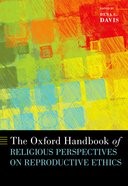 The Oxford Handbook of Religious Perspectives on Reproductive Ethics
The Oxford Handbook of Religious Perspectives on Reproductive Ethics
Contents
-
-
-
-
-
-
-
-
-
The Question of Cultural Relativism in Ethical Values The Question of Cultural Relativism in Ethical Values
-
The Nature of Islamic Ethical Discourse The Nature of Islamic Ethical Discourse
-
The Principles and Rules in Islamic Juristic Ethics The Principles and Rules in Islamic Juristic Ethics
-
Islamic Principles of Bioethics Islamic Principles of Bioethics
-
The Rule of “No Harm, No Harassment” The Rule of “No Harm, No Harassment”
-
Reproductive Genetics Reproductive Genetics
-
Notes Notes
-
-
-
-
-
-
-
-
-
-
-
-
-
-
4 Muslim Reproductive Ethics: Sources and Methodology
Get accessAbdulaziz Sachedina is professor and Endowed IIIT Chair in Islamic Studies at George Mason University in Fairfax, Virginia. Dr. Sachedina, who has studied in India, Iraq, Iran, and Canada, obtained his PhD from the University of Toronto. He has been conducting research and writing in the field of Islamic Law, Ethics, and Theology (Sunni and Shiite) for more than four decades. In the last twenty years he has concentrated on social and political ethics, including interfaith and intrafaith relations, Islamic biomedical ethics, and Islam and human rights. Dr. Sachedina’s publications include Islamic Messianism (State University of New York, 1980); Human Rights and the Conflicts of Culture, coauthored (University of South Carolina, 1988); The Just Ruler in Shiite Islam (Oxford University Press, 1988); The Prolegomena to the Qur’an (Oxford University Press, 1998); The Islamic Roots of Democratic Pluralism (Oxford University Press, 2002); Islamic Biomedical Ethics: Theory and Application (Oxford University Press, 2009); Islam and the Challenge of Human Rights (Oxford University Press, 2009); and Islamic Ethics: Fundamental Aspects of Human Conduct (Oxford University Press, 2022), in addition to numerous articles in academic journals.
-
Published:19 September 2024
Cite
Abstract
Assisted Reproductive Technology (ART) provides Islamic bioethics a rare opportunity to analyze the ethical ramifications of the impact of science and technology on the sexual and asexual procreation in the light of certain reproductive technologies that transgress the boundaries of normal sexual reproduction. This chapter explores previously under-examined issues of gender, embodiment, and human dignity in Islamic bioethics as they appear in ARTs—including those that involve third-party sperm donors. Building on earlier discussions of normatively conceived human procreation, the threat to the preservation of untainted homologous lineage appears greatest to the multiple parties involved in cases of heterologous ARTs. Whereas homologous ARTs are completely acceptable by all Muslim jurists, heterologous ARTs pose potential problems in Shari‘a, and need additional attention and safeguards. This study also has implications for the development of Islamic bioethics generally, by showing the crucial need to account for well-defined values that govern gender relations not directly and coherently addressed by the historical Islamic interpretive jurisprudence, nor adequately considered at the clinical level.
Sign in
Personal account
- Sign in with email/username & password
- Get email alerts
- Save searches
- Purchase content
- Activate your purchase/trial code
- Add your ORCID iD
Purchase
Our books are available by subscription or purchase to libraries and institutions.
Purchasing information| Month: | Total Views: |
|---|---|
| September 2024 | 2 |
| November 2024 | 13 |
| December 2024 | 3 |
| February 2025 | 2 |
| April 2025 | 2 |
Get help with access
Institutional access
Access to content on Oxford Academic is often provided through institutional subscriptions and purchases. If you are a member of an institution with an active account, you may be able to access content in one of the following ways:
IP based access
Typically, access is provided across an institutional network to a range of IP addresses. This authentication occurs automatically, and it is not possible to sign out of an IP authenticated account.
Sign in through your institution
Choose this option to get remote access when outside your institution. Shibboleth/Open Athens technology is used to provide single sign-on between your institution’s website and Oxford Academic.
If your institution is not listed or you cannot sign in to your institution’s website, please contact your librarian or administrator.
Sign in with a library card
Enter your library card number to sign in. If you cannot sign in, please contact your librarian.
Society Members
Society member access to a journal is achieved in one of the following ways:
Sign in through society site
Many societies offer single sign-on between the society website and Oxford Academic. If you see ‘Sign in through society site’ in the sign in pane within a journal:
If you do not have a society account or have forgotten your username or password, please contact your society.
Sign in using a personal account
Some societies use Oxford Academic personal accounts to provide access to their members. See below.
Personal account
A personal account can be used to get email alerts, save searches, purchase content, and activate subscriptions.
Some societies use Oxford Academic personal accounts to provide access to their members.
Viewing your signed in accounts
Click the account icon in the top right to:
Signed in but can't access content
Oxford Academic is home to a wide variety of products. The institutional subscription may not cover the content that you are trying to access. If you believe you should have access to that content, please contact your librarian.
Institutional account management
For librarians and administrators, your personal account also provides access to institutional account management. Here you will find options to view and activate subscriptions, manage institutional settings and access options, access usage statistics, and more.